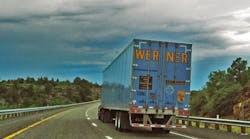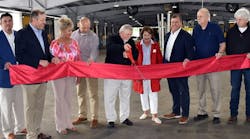PRINCETON, NJ. Although “freight is not sitting on the dock right now,” demand “has not changed in any meaningful way … and is growing at the same rate as 2011,” according to Derek Leathers, president and COO of Werner Enterprises (NASDEQ: WERN). Mild weather at the start of 2012 that allowed some trucking activity to be pulled forward accounts for some of the current weakness in the freight markets, “but the tonnage index is still ahead of the previous years and now the freight has to move,” he said during his keynote address at the ALK Transportation Technology Summit.
Declaring Werner to be “mode neutral,” Leathers said the company remains bullish on intermodal growth and will compete with intermodal services “where it makes sense because if we don’t, someone else will.” Overall, though, he pointed out that trucks currently carry 77% of all domestic surface freight and even as intermodal grows “that won’t change.”
Turning to the overall economy, Leathers agreed with the general consensus that GDP growth will remain “slow but uneventful at just north of 2%.” While that growth is “not the kind we grew up with” and “nothing to write home about,” he suggested that focusing on GDP alone overlooks another important economic indicator, the inventory to sales ratio.
“It’s arguable as low as it’s ever been,” Leathers said. Any “blip in demand” will deplete that low inventory, requiring producers to respond. “And that will take up all the capacity out there in a hurry,” he said.
As for fleets adding capacity to take advantage of stronger freight markets, Leathers believes “the capital isn’t there for truckers to expand as demand increases. All the capacity that left [in the recession] will not return in the near- or medium-term.” With the large publically traded carriers like Werner having shrunk their capacity by 20% over the past few years, “the trucks will not be there as GDP picks up, and we’re going to need creative ways to move that freight.”
Turning to rates, Leathers said “I know they will go up because our costs are rising,” although he believes there is still room for further optimization to help contain carrier costs. With the average age U.S. truck fleet now seven years, it will take a $67 billion investment over the next two years to bring the fleet average age “back into balance,” he pointed out. With residual values of those older trucks “worthless,” and new truck prices boosted significantly by new emissions technology, fleets “will have to ask for higher rates to compensate,” he said.
No matter how much or quickly they rise, Werner is looking for “rates that are scaleable,” Leathers told the summit attendees. “We want rates that move your freight year in and out, not blue light specials. Someone else can take that one. We’ll take two through 20 at rates that are repeatable.”
While the economic indicators driving rates are relatively predictable, Leather said two important variables are not – driver wages and the cost of new regulations. “We can’t price for crazy,” he said, pointing out Werner’s contracts include options to recover unexpected increases in those two areas.



